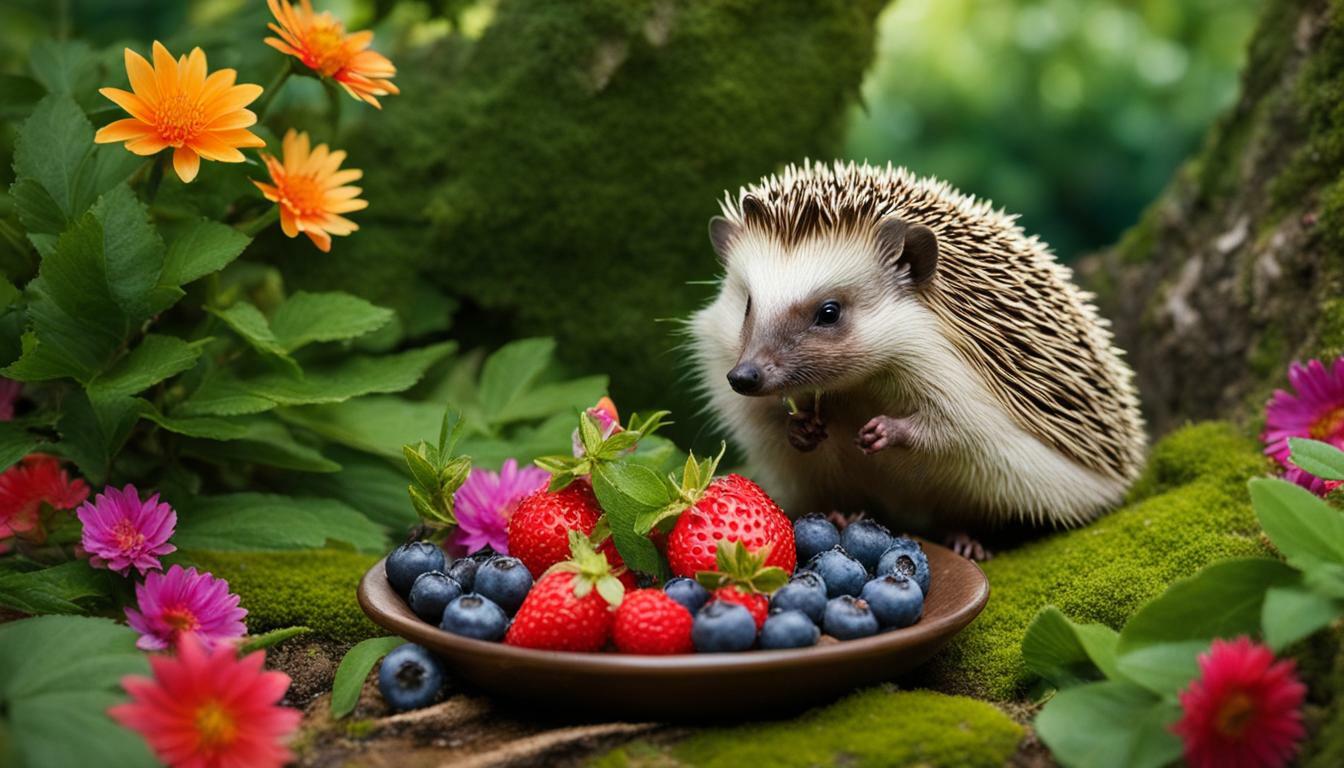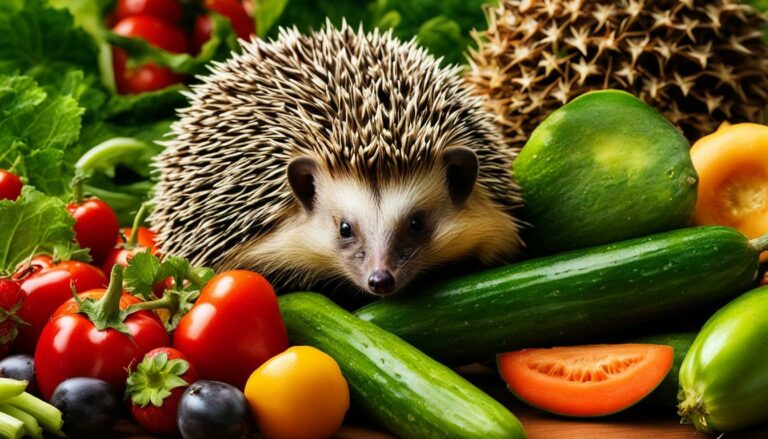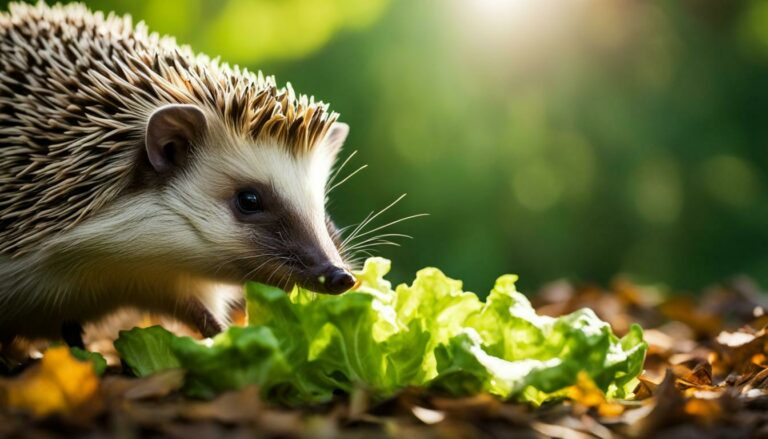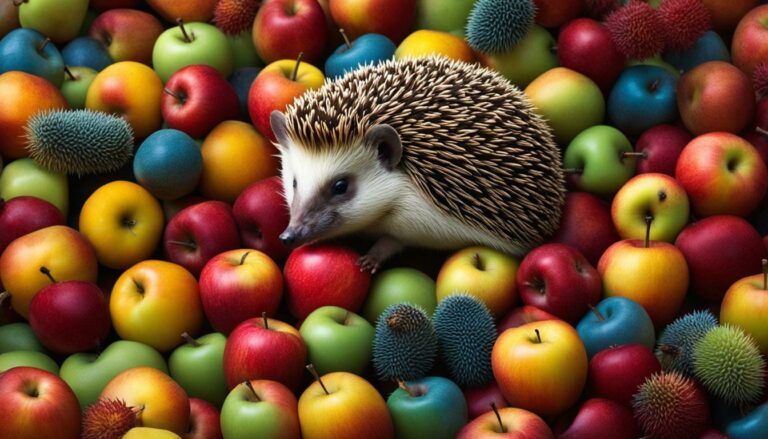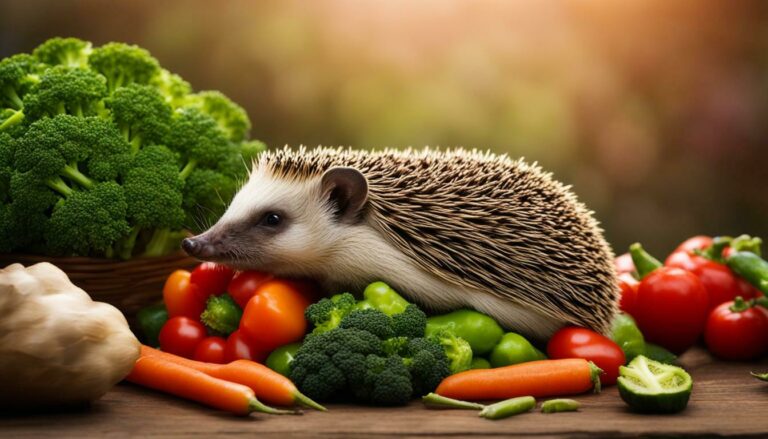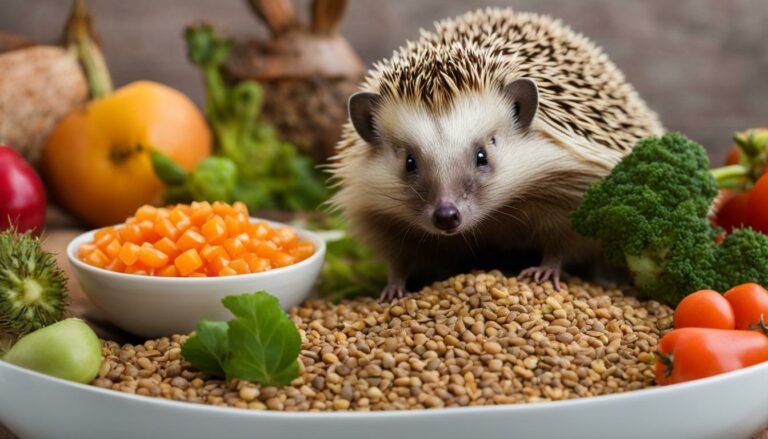Can Hedgehogs Eat Blueberries? Facts and Dietary Tips
Hedgehogs are omnivorous animals, capable of eating a wide range of foods. Many hedgehog owners wonder if blueberries can be included in their pet’s diet. Blueberries are safe for hedgehogs to consume, but they should be fed in moderation due to their high sugar content. Here are some key facts and dietary tips to consider when feeding blueberries to hedgehogs:
Key Takeaways:
- Blueberries are considered safe for hedgehogs to eat.
- They are a good source of antioxidants and can be a tasty treat for your pet.
- However, blueberries should be fed in moderation to avoid obesity and weight-related health issues.
- It is important to remove the skin from blueberries before feeding them to your hedgehog.
- Other fruits that are safe for hedgehogs to consume include apples, pears, bananas, and strawberries.
- Avoid feeding hedgehogs citrus fruits, grapes, raisins, avocados, and any foods that are toxic to animals.
- When feeding fruits to hedgehogs, it is best to choose organic options to avoid harmful pesticides.
- Always wash the fruits thoroughly before feeding them to your hedgehog to remove any contaminants.
- Consult with a veterinarian or a hedgehog expert for specific dietary recommendations for your pet.
By following these guidelines, you can safely incorporate blueberries and other fruits into your hedgehog’s diet as occasional treats. Remember, a balanced and appropriate diet is crucial for the health and well-being of your pet hedgehog.
Are Blueberries Good For Hedgehogs?
Blueberries are considered safe and beneficial for hedgehogs, providing a range of nutritional benefits for their overall health and well-being. As an omnivorous animal, hedgehogs can eat a variety of foods, and blueberries are one of the fruits that they can enjoy in moderation. Not only do blueberries make a tasty treat for hedgehogs, but they also offer several health advantages.
Blueberries are rich in antioxidants, which are essential for fighting free radicals and reducing the risk of certain diseases, including cancer and heart conditions. They also contain vitamin C, which supports the immune system and contributes to healthy cell growth and repair. Additionally, blueberries have a lower sugar content compared to many other fruits, making them a suitable choice for hedgehogs, considering their tendency to gain weight easily.
It is important to note that while blueberries can be a healthy addition to a hedgehog’s diet, they should be given in moderation. Too many blueberries or any other high-sugar fruits can lead to obesity and related health issues. It is recommended to feed blueberries to hedgehogs no more than three times a week, offering a small portion equivalent to around half to a whole blueberry per day.
| Nutritional Content of Blueberries (per 1 cup) | Amount |
|---|---|
| Calories | 84 |
| Fat | 0.5g |
| Sodium | 1.5mg |
| Carbohydrates | 21g |
| Fiber | 3.6g |
| Sugars | 15g |
| Proteins | 1g |
| Vitamin C | 14.4mg |
Other Fruits Safe for Hedgehogs
In addition to blueberries, there are several other fruits that are safe for hedgehogs to consume. These include apples, bananas, pears, strawberries, and kiwi. When feeding fruits to hedgehogs, it is important to offer them in moderation, as excessive sugar intake can lead to weight gain and health problems. Always ensure that any fruits given to hedgehogs are fresh, thoroughly washed, and cut into small, manageable pieces to prevent choking hazards.
While fruits can provide nutritional benefits for hedgehogs, it is crucial to avoid feeding them certain fruits that can be toxic or harmful. Grapes and raisins, for example, are known to be toxic to hedgehogs and can cause kidney and liver failure. Citrus fruits such as oranges, lemons, and limes are highly acidic and can lead to digestive issues in hedgehogs. It is best to err on the side of caution and avoid feeding these fruits to hedgehogs.
When introducing fruits to a hedgehog’s diet, it is recommended to consult with a veterinarian or an experienced hedgehog owner to ensure that the fruits chosen are suitable and safe. Additionally, always monitor the hedgehog’s weight and overall health to prevent any issues related to diet and nutrition.
Types of Blueberries to Feed Hedgehogs
When feeding blueberries to hedgehogs, it is important to consider the type of blueberries available and choose the most suitable option for your pet. There are three main types of blueberries that you can feed to your hedgehog: wild blueberries, organic blueberries, and dried blueberries.
Wild Blueberries
Wild blueberries are those that are found on blueberry bushes in their natural habitat. While they may seem like a healthy choice for hedgehogs, it is best to avoid feeding them wild blueberries. This is because wild blueberries can harbor bacteria and insects that may be harmful to your hedgehog’s health. It is always safer to choose other options to ensure the well-being of your pet.
Organic Blueberries
Organic blueberries are the best option when it comes to buying blueberries for your hedgehog. Look for organic blueberries from reputable sources to ensure they are free from pesticides and other chemicals. Even though they are organic, it is still important to wash the berries before feeding them to your hedgehog to remove any residual chemicals that may be present.
Dried Blueberries
Dried blueberries should be avoided when feeding hedgehogs. These berries rely on preservatives to prevent spoilage and have a higher sugar-to-weight ratio compared to fresh blueberries. Feeding dried blueberries to your hedgehog can lead to weight gain and other health issues. It is best to stick to fresh blueberries as a safer and healthier option for your pet.
| Type of Blueberries | Feeding Recommendation |
|---|---|
| Wild Blueberries | Avoid feeding wild blueberries due to potential bacterial and insect contamination. |
| Organic Blueberries | Choose organic blueberries from reputable sources and wash them before feeding to remove any residual chemicals. |
| Dried Blueberries | Avoid feeding dried blueberries as they can lead to weight gain and other health issues. |
In summary, when it comes to feeding blueberries to your hedgehog, it is important to choose the right type of blueberries. Avoid feeding them wild blueberries due to potential contamination, opt for organic blueberries from reliable sources, and steer clear of dried blueberries. By making these choices, you can ensure that your hedgehog enjoys a safe and nutritious diet.
How Many Blueberries Can Hedgehogs Eat?
Blueberries should be fed to hedgehogs in moderation, with recommended portion sizes and frequency to ensure a balanced diet. While blueberries are safe for hedgehogs to consume, they should be given as a treat rather than a main meal due to their high sugar content. It is important to monitor your hedgehog’s sugar consumption to prevent obesity and weight-related illnesses.
When feeding blueberries to your hedgehog, it is best to offer fresh raw blueberries rather than dried ones, as dried blueberries can be a choking hazard. Make sure to remove the skin from the blueberries before feeding them to your hedgehog, as hedgehogs cannot eat the skin.
The recommended portion size for blueberries is around half to a whole blueberry, depending on the size of your hedgehog. It is advised to feed blueberries to your hedgehog three times a week, offering the equivalent of a teaspoon of fruit per day. This portion size may not seem like much, but it is appropriate for the small stomach of a hedgehog.
Other Fruits Safe for Hedgehogs
In addition to blueberries, there are several other fruits that are safe and beneficial for hedgehogs to consume as part of a balanced diet. Some of these fruits include apples, bananas, pears, strawberries, and kiwi. It is important to prepare these fruits appropriately by removing any skins or seeds and cutting them into small pieces to prevent choking hazards. Remember to feed fruits in moderation to maintain a healthy diet for your hedgehog.
| Fruit | Preparation |
|---|---|
| Apples | Remove skin, cut or mush into small pieces |
| Bananas | Remove peel, feed ripe yellow bananas |
| Pears | Remove skin, cut into small pieces |
| Strawberries | Cut off the skin, cut into small pieces, avoid feeding mushy or moldy strawberries |
| Kiwi | Remove skin, feed in moderation |
It is important to note that hedgehogs should not be fed certain fruits that can be toxic or harmful to their health, such as grapes, raisins, oranges, and avocados. These fruits can cause serious illnesses and should be avoided.
By following these guidelines and offering a variety of safe fruits in moderation, you can provide your hedgehog with a balanced and nutritious diet.
Other Fruits Safe for Hedgehogs
In addition to blueberries, there are several other fruits that can be safely included in a hedgehog’s diet, providing a variety of flavors and nutritional benefits. Here are some of the best fruits for hedgehogs:
| Fruit | Nutritional Benefits |
|---|---|
| Apples | Rich in fiber and vitamin C. |
| Bananas | Good source of potassium and easily digestible. |
| Pears | High in fiber and provide a crunchy texture for chewing. |
| Strawberries | Low in sugar and rich in vitamins and antioxidants. |
| Kiwi | Contains fiber and vitamin C. |
When feeding these fruits to your hedgehog, make sure to wash them thoroughly and remove any peels or skins that may be difficult for the hedgehog to chew and digest. Cut the fruits into small, bite-sized pieces to prevent choking hazards.
It’s important to note that while fruits can be a healthy addition to a hedgehog’s diet, they should be given in moderation. Too much fruit, even the safe ones, can lead to obesity and other health issues in hedgehogs. Always consult with a veterinarian or a hedgehog nutrition specialist for guidance on the appropriate portion sizes and feeding frequency for fruits and other foods.
Overall, a varied diet that includes a mix of high-quality cat food, insects, and small amounts of safe fruits can help ensure that your hedgehog gets the necessary nutrients for optimal health and well-being.
Fruits to Avoid Feeding Hedgehogs
While there are many fruits that are safe for hedgehogs, there are also some that should be avoided to prevent any potential harm or health issues. These fruits may be toxic to hedgehogs or have adverse effects on their digestive system. It’s important to be aware of these fruits and avoid feeding them to your pet hedgehog. Here is a list of fruits that should be avoided:
| Fruits to Avoid | Reason |
|---|---|
| Grapes | Grapes are toxic to hedgehogs and can lead to kidney or liver failure even in small amounts. |
| Oranges | Oranges and other citrus fruits are highly acidic and can cause gastrointestinal upset, overproduction of stomach acid, and digestive issues in hedgehogs. |
| Dried Fruit | Dried fruits, including raisins, have high sugar content and can lead to obesity and other health problems in hedgehogs. |
| Avocado | Avocado contains a substance called persin, which is toxic to hedgehogs and can cause digestive issues and other health problems. |
| Pineapples | Pineapples are highly acidic and can cause stomach upset and digestive discomfort in hedgehogs. |
| Wild Berries | Wild berries can be unsafe for hedgehogs as they may harbor bacteria and insects that can be harmful to their health. |
It’s important to note that this is not an exhaustive list, and there may be other fruits that are also unsuitable for hedgehogs. If you are unsure about the safety of a particular fruit, it’s best to consult with a veterinarian or do further research before feeding it to your hedgehog.
Conclusion
Feeding a balanced and appropriate diet is crucial for the health and well-being of hedgehogs. While there are many fruits that can be enjoyed as part of their diet, it’s important to be aware of the fruits that should be avoided. By providing a safe and suitable diet, you can ensure that your hedgehog stays healthy and happy.
Tips for Feeding Fruits to Hedgehogs
When introducing fruits, such as blueberries, into a hedgehog’s diet, it is important to follow certain guidelines to ensure their health and well-being. Hedgehogs are omnivores, but their digestive system is not well-suited for all fruits. Here are some tips to consider when feeding fruits to hedgehogs:
1. Moderation is key:
While blueberries are safe for hedgehogs, they should be given in moderation due to their high sugar content. Aim to feed your hedgehog one to three blueberries per week. Remember, fruits should only make up a small portion of their overall diet.
2. Choose organic:
Opt for organic blueberries whenever possible. Organic berries are grown without the use of harmful pesticides and chemicals, reducing the risk of potential health issues for your hedgehog. Wash the berries thoroughly before feeding to remove any residue.
3. Remove the skin:
Hedgehogs cannot eat blueberry skin, so it is important to remove it before serving. The skin can be difficult to chew and may pose a choking hazard.
4. Cut into small pieces:
To ensure easy consumption and prevent choking, cut the blueberries into small, bite-sized pieces. This will help your hedgehog safely enjoy their treat.
5. Offer a variety of fruits:
While blueberries can be a tasty treat for hedgehogs, it is important to provide them with a diverse diet. Consider offering other safe fruits such as apples, bananas, pears, and strawberries. These fruits should also be given in moderation and prepared appropriately (peeled, cut into small pieces).
Remember, fruits should always be offered as a supplement to a balanced hedgehog diet that consists primarily of high-quality cat food formulated for hedgehogs. Consult with a veterinarian or a qualified hedgehog specialist for personalized guidance on your hedgehog’s nutritional needs.
| Fruits Safe for Hedgehogs | Fruits to Avoid |
|---|---|
| Apples | Grapes |
| Bananas | Oranges |
| Pears | Lemons |
| Strawberries | Limes |
| Blueberries | Raisins |
By following these tips, you can safely incorporate blueberries and other fruits into your hedgehog’s diet. Remember to prioritize a balanced and appropriate diet to ensure the overall health and well-being of your adorable prickly pet.
Conclusion
In conclusion, blueberries can be a safe and enjoyable addition to a hedgehog’s diet when fed in moderation, alongside other suitable fruits and a balanced nutrition plan. Hedgehogs are omnivores and can eat a variety of foods, including fruits, to supplement their primarily insect-based diet. Blueberries are non-toxic and provide various health benefits, such as being a good source of antioxidants and containing vitamins like vitamin C and B6.
However, it’s important to remember that blueberries, like all fruits, contain sugars and should only be given to hedgehogs in moderation. Excessive consumption of sugary foods can lead to dental and weight-related issues, such as obesity. It’s recommended to offer hedgehogs no more than two to three blueberries per week, as part of a varied and balanced diet.
When feeding blueberries to hedgehogs, it’s crucial to remove the skin and cut them into small, manageable pieces. This helps prevent choking hazards and ensures that the hedgehogs can safely consume the fruit. Additionally, it’s important to choose fresh and organic blueberries to minimize the risk of exposure to pesticides or other chemicals.
While blueberries are a suitable fruit option for hedgehogs, there are also other fruits that can be included in their diet. Apples, bananas, strawberries, and pears are some of the other fruits that hedgehogs can safely consume, provided they are prepared and served appropriately. On the other hand, there are certain fruits, like grapes, oranges, and raisins, that should be avoided as they can be toxic to hedgehogs.
Overall, maintaining a balanced and appropriate diet is key to ensuring the health and well-being of hedgehogs. Consult with a veterinarian or animal nutritionist to determine the best dietary plan for your pet hedgehog, taking into consideration their specific nutritional needs and any individual health concerns. By providing a varied and suitable diet, including the occasional treat of blueberries, you can help support your hedgehog’s overall health and enjoyment of mealtime.
FAQ
Q: Can hedgehogs eat blueberries?
A: Yes, hedgehogs can eat blueberries. They are considered safe for hedgehogs to consume, but should be given in moderation as they are high in sugar.
Q: Are blueberries good for hedgehogs?
A: Blueberries are non-toxic and can be a safe and enjoyable treat for hedgehogs. They are high in antioxidants and lower in sugar compared to other fruits, making them a good choice for an occasional treat.
Q: What types of blueberries can hedgehogs eat?
A: Hedgehogs should avoid feeding on wild or dried blueberries. It is best to choose organic blueberries from a reputable source, and make sure to wash them before feeding.
Q: How many blueberries can hedgehogs eat?
A: Hedgehogs should be fed blueberries three times a week, with the equivalent of a teaspoon of fruit per day. This typically translates to feeding half to a whole blueberry.
Q: What other fruits are safe for hedgehogs?
A: Hedgehogs can also eat apples, bananas, pears, strawberries, and kiwi. However, grapes, oranges, and raisins should be avoided as they can be toxic to hedgehogs.
Q: What fruits should hedgehogs avoid?
A: Hedgehogs should not be fed avocados, citrus fruits, dried fruits, grapes, lemons, limes, oranges, pineapples, or wild berries. These fruits can be harmful or toxic to hedgehogs.
Q: What are some tips for feeding fruits to hedgehogs?
A: When feeding fruits to hedgehogs, it is important to choose organic options, feed in moderation, wash the fruit thoroughly, and cut it into small pieces to prevent choking hazards.
Q: What is the importance of a balanced diet for hedgehogs?
A: A balanced diet is crucial for the overall health and well-being of hedgehogs. It helps prevent obesity, promotes proper digestion, and provides essential nutrients for their specific dietary needs.
Q: Can hedgehogs eat blueberries as their main food?
A: No, blueberries should not be the main food for hedgehogs. While they can enjoy blueberries as a treat, their primary diet should consist of protein-rich foods, such as insects, and high-quality hedgehog or cat food.
